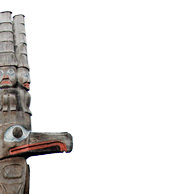 |
|||||||||
 |
|||||||||
 |
|||||||||

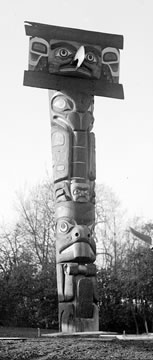 Thunderbird
Park, 1950s. BC Archives B-07303. Thunderbird
Park, 1950s. BC Archives B-07303. |
Haida Mortuary Pole, 19th centuryThis is an original pole that was purchased by Charles F. Newcombe at t’anuu ‘llnagaay (eelgrass town) on Haida Gwaii in 1911. At that time the town was no longer inhabited; the people had gathered in other communities such as Skidegate after the devastating population losses of the smallpox epidemic of 1862 and in response to pressure from government agents and missionaries. Newcombe, a Victoria physician and botanist, collected First Nations objects for the British Columbia Provincial Museum (now the Royal BC Museum) as well as for other museums in North America and Europe. He recorded that the pole commemorates a high-ranking woman who was shot while travelling through the San Juan Islands. (Haida canoes regularly travelled the coast to trade and socialize.) Her body was cremated and the remains taken back to t’anuu ‘llnagaay, where they were placed inside the cavity behind the frontal board. Photographs taken at t’anuu ‘llnagaay in 1901 show a carved Eagle on top of the frontal board and a Copper (a copper plaque symbolizing chiefly wealth and status) leaning against it. The Eagle and Copper were no longer there when the pole was erected in Thunderbird Park in 1941, and the pole had been somewhat clumsily repainted.RBCM 1392. |
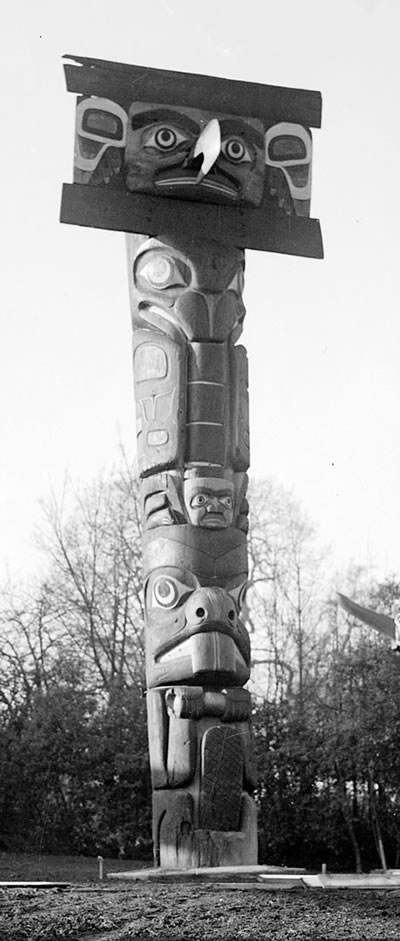 |
Mountain Hawk, portrayed on the frontal board. The face and flat, curved beak are carved in relief; the wings are painted on the frontal board. |
| Whale, with three skils, or potlatch rings, between its flukes. These are indications of wealth and prestige gained from potlatching. | |
| Human head wearing a hat with three skils, or potlatch rings. This head may represent the deceased. The head is between the ears of the Beaver below. | |
| Beaver, with the characteristic large front teeth and
flat, cross-hatched tail, holding a stick. Like the other figures on
the pole, it is a crest of the deceased.
|
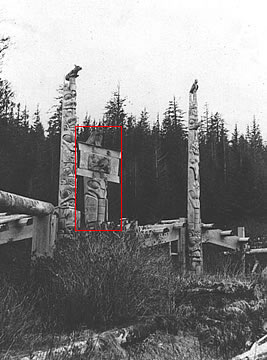 t’anuu ‘llnagaay,
1901. Charles F. Newcombe photograph. RBCM PN 6. t’anuu ‘llnagaay,
1901. Charles F. Newcombe photograph. RBCM PN 6. |
|
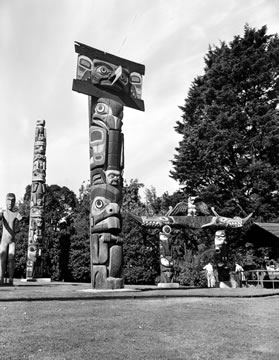 Thunderbird Park, 1950s. BC Government photograph. BC Archives I-21005. Thunderbird Park, 1950s. BC Government photograph. BC Archives I-21005. |
|
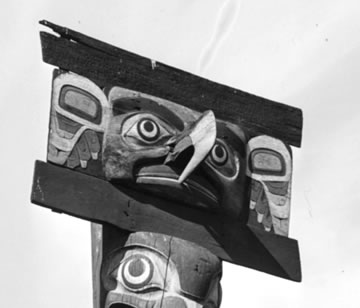 Thunderbird Park, 1950s. BC Government photograph.
BC Archives I-21005. Thunderbird Park, 1950s. BC Government photograph.
BC Archives I-21005. |
|
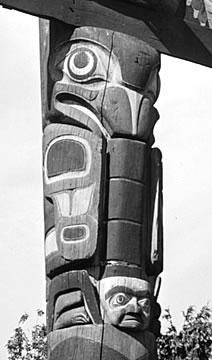 Thunderbird
Park, 1950s. BC Government photograph. BC Archives I-21005. Thunderbird
Park, 1950s. BC Government photograph. BC Archives I-21005. |
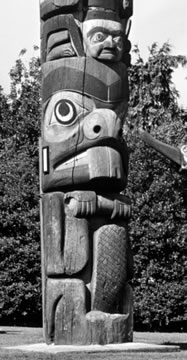 Thunderbird
Park, 1950s. BC Government photograph. BC Archives I-21005. Thunderbird
Park, 1950s. BC Government photograph. BC Archives I-21005. |
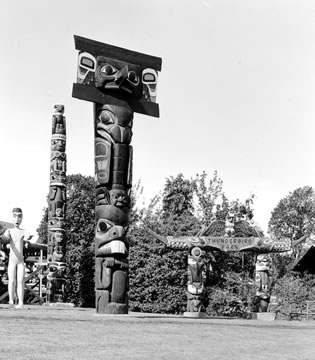 Thunderbird
Park, 1952. BC Government photograph. BC Archives I-21008. Thunderbird
Park, 1952. BC Government photograph. BC Archives I-21008. |
|
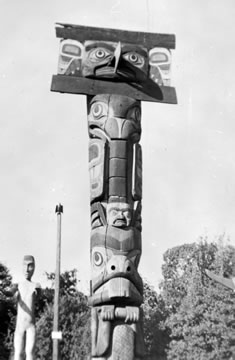 Thunderbird Park, 1951. RBCM PN 7272. Thunderbird Park, 1951. RBCM PN 7272. |
|
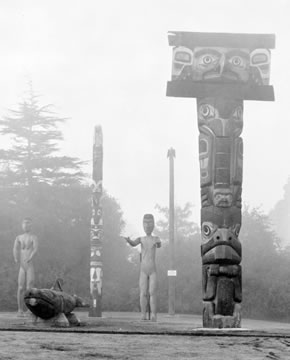 Thunderbird Park. Trio Crocker photograph. RBCM PN 11687. Thunderbird Park. Trio Crocker photograph. RBCM PN 11687. |
|
 Thunderbird
Park. Trio Crocker photograph. RBCM PN 11690. Thunderbird
Park. Trio Crocker photograph. RBCM PN 11690. |
|
| Back to Map |
